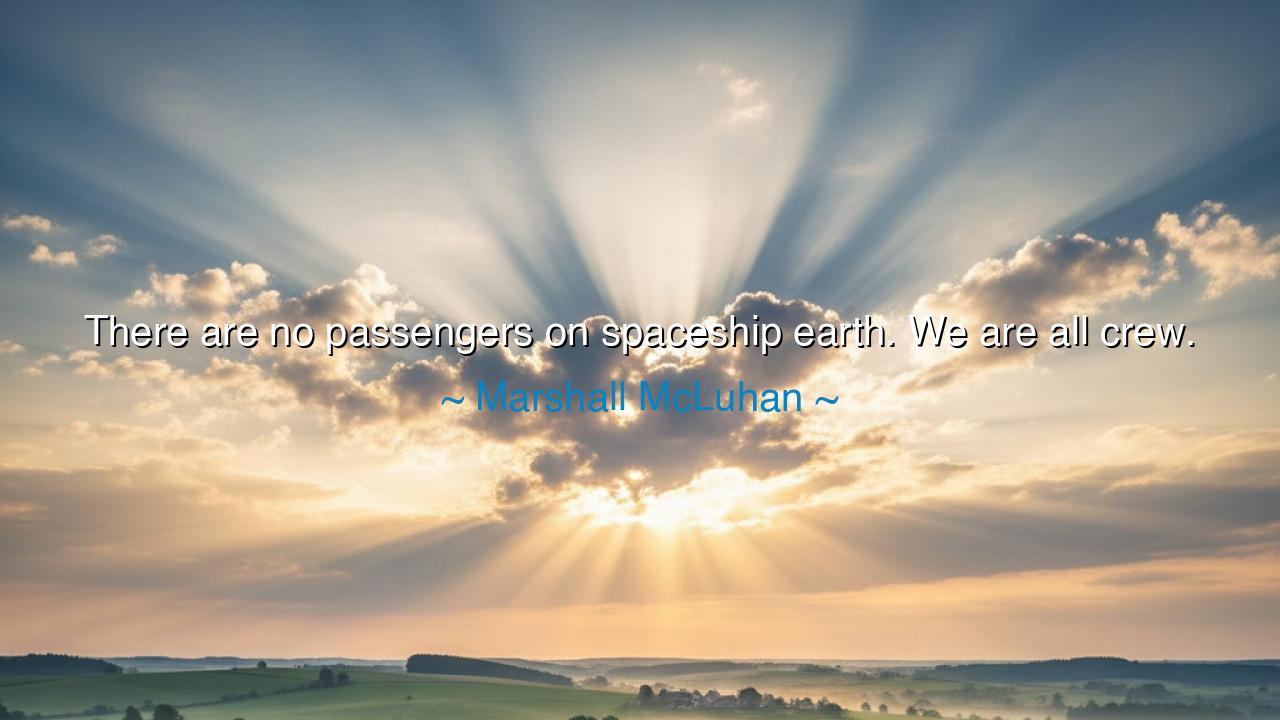
There are no passengers on spaceship earth. We are all crew.






In the great, uncharted expanse of the cosmos, where the stars are but distant beacons of light, and our planet drifts through space like a fragile vessel, there is a profound truth that Marshall McLuhan captured in his timeless words: "There are no passengers on spaceship Earth. We are all crew." These words are a call to arms, an invitation to understand that the journey of humanity—the great voyage that is our existence—does not allow for passive observers. We are all, each of us, a part of this mighty journey, with a role to play, a responsibility to uphold, and a destiny to shape. The ship of Earth sails ever onward, and we are not just its passengers; we are its crew, working together to ensure its survival and its future.
In ancient times, the cosmos was seen as a grand cosmic ship, steered by the gods, who guided the heavens and the Earth. The Greeks saw the world as an interconnected whole, where humanity, though small, played a vital role in the balance of the universe. The philosophers of ancient Greece, such as Heraclitus, believed that the world was in a constant state of flux, like a river flowing, ever-changing and ever-moving. They saw humans not as passive bystanders but as active participants in the cosmic dance. McLuhan’s words echo this ancient view—reminding us that Earth is not a passive place to be lived on, but a ship that we must sail, not as individuals, but as a collective crew, each with a part to play in its journey through the vast unknown.
The concept of humanity as crew on a shared vessel also calls to mind the great explorers who once set sail into the unknown, guided by the stars and the promise of new horizons. Consider the story of Christopher Columbus, who, in 1492, sailed westward into the uncharted waters of the Atlantic, driven by the belief that there was more to the world than what was known. His crew, with their varied skills and experiences, worked together to navigate the seas, facing storms and dangers that would have broken lesser men. In the face of the unknown, they were not just passengers on a ship; they were co-creators of history, with each one contributing to the success of the journey. Similarly, in the journey of life, we, as crew members of spaceship Earth, must work together to ensure that our ship sails safely and toward a future that benefits all of humanity.
McLuhan’s message is one of shared responsibility. We are not isolated beings on this planet, drifting aimlessly through time. Each of us is part of a larger system, a crew that must cooperate and contribute to the well-being of the whole. This is especially crucial in an age where the challenges we face—whether it be the environmental crises, technological advancement, or the ever-changing political landscape—demand collective action. In times of great struggle, it is easy to forget our shared humanity, to see others as passengers rather than active participants. But as McLuhan wisely notes, we must act as crew, working together to steer the ship, to navigate the storms, and to build a future that benefits all.
Think of the story of the Apollo 11 mission, when Neil Armstrong and Buzz Aldrin became the first humans to set foot on the moon in 1969. That monumental achievement was not the work of a single individual, but of a collective effort—a team of engineers, scientists, astronauts, and countless others who worked together as crew to make the dream of space travel a reality. Each person played a vital role, and each person understood that their contribution was part of something far larger than themselves. In the same way, humanity today faces challenges that cannot be overcome by a few individuals or a single nation. It is only through global cooperation, through the recognition that we are all on the same ship, that we can hope to overcome the crises that threaten our world and ensure a better future for generations to come.
The lesson in McLuhan’s words is clear: the destiny of Earth is in our hands. We are not passive observers of the world, waiting for others to lead the way. We are all creators, builders, and shapers of the future. Each of us has a role to play, whether it is in science, arts, politics, or everyday life. The question is not whether we will play our part, but how we will contribute to the success of our collective journey. Will we stand idle, waiting for someone else to take charge, or will we take responsibility and contribute our talents, our wisdom, and our strength to the greater good?
So, let us take up the mantle of crew aboard spaceship Earth. Let us acknowledge the greatness of the journey ahead and understand that the future of our world depends on our unity and our commitment to one another. The ship of Earth sails ever onward, through uncharted waters and unpredictable storms, but with every person aboard contributing to its success, we can guide it toward a future of peace, prosperity, and understanding. Let us remember that we are all in this together—no longer passengers, but crew—working together to steer the ship of Earth toward a future where we can all thrive.






AAdministratorAdministrator
Welcome, honored guests. Please leave a comment, we will respond soon